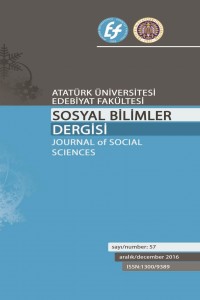DOĞU ALMAN YAZININDA GÖÇ VE SÜRGÜN / Migration and Exile in East German Literature
Abstract
Öz
Kırk yıllık bir dönemi kapsayan
Demokratik Alman Cumhuriyeti’nde (1949-1989),
başka deyişle Doğu Almanya’da ikamet eden
yazarlar yapıtlarında Almanya’nın ikiye
bölünmesini farklı bir biçimde ele almışlardır. Bu
sebepten ötürü Doğu Alman Yazını’nda göç,
bölünme, sürgün, öteki taraf, sınır, Berlin Duvarı
gibi izlekler sık sık karşımıza çıkmaktadır.
Yaşanan ekonomik duraksama dönemi, işsizliğin
artması ve yazarlara ve sanatçılara karşı yapılan
baskıların artmasıyla pek çok insan Batı’ya göç
etmeye başlar. 1961 yılında Berlin kentini ikiye
bölen Duvar’ın örülmesiyle bu kitlesel göçler
durdurulmak istense de pek başarılı olunamaz
ve pek çok sanatçı ve yazar göç etmek
zorunda kalır. Biz bu çalışmada Doğu Alman
Yazını ekin politikasında izlenen yolun
özelliklerini yazın tarihsel bir yaklaşımla tespit
ettikten sonra, birkaç yapıttan yola çıkarak
kısaca Doğu-Batı sorunsalı, göç, sürgün ve sınır gibi
izleklerin nasıl ele alındığını ve yazınsal metinlere
nasıl yansıdığını ortaya koymayı amaçlıyoruz.
Çalışmamızın sonunda esasen Alman Yazını’nda
Nasyonal sosyalizm bağlamında kullanılan “Alman
Sürgün Edebiyatı” ifadesinin Doğu Alman Yazını
için de geçerli olup olmadığını tartışmak istiyoruz.
Anahtar sözcükler: Doğu Alman yazını, sürgün
yazını, göç, Doğu Alman ekin politikası
Abstract
In the Democratic Republic of Germany
(1949-1989), which comprises a period of forty
years, authors living in Eastern Germany have
treated the division of Germany in different ways.
For this reason, the East German Literature shows
often signs of themes such as migration, division,
exile, the other side, the border and the Berlin Wall.
Many people started to migrate to the West as a
result of the economic recession, the increase in
unemployment and the increase in pressure against
writers and artists. Although these mass
migrations were intended to be blocked through
the Berlin Wall, which dichotomizes the city of
Berlin, it was not successful and many artists and
writers had to migrate. After identifying the
features of the cultural policies in the East
German Literature through a historical approach,
we aim to reveal in this study how the East-West
problem, immigration, exile and border issues
are handled and reflected in literary texts. At the
end of the study, we would like also to discuss
whether the expression "German Exile
Literature", which is mainly used in German
Literature in the context of National Socialism, is
valid for East German Literature.
Keywords: East German Literature, Exile
Literature, migration, East German cultural policy
Keywords
References
- Emmerich, W. (2000). Kleine Literaturgeschichte der DDR. Berlin: Aufbau.
- Heym, S. (1989). Mein Richard. W. Brettschneider (Dü.) içinde, Arbeitstexte für den Unterricht. Erzaehlungen aus der DDR (s. 42-61). Stuttgart: Reclam.
- Jäger, M. (1995). Kultur und Politik in der DDR 1945-1990. Köln: Edition Deutschland Archiv.
- Krättli, A. (1979). Atemnot. Zur Situation einiger Schriftsteller in der DDR. Schweizer Monatshefte, Bd. 59(Heft 5), S. 352-357.
- Kunze, R. (1981). Die Wunderbaren Jahre. Prosa. Frankfurt am Main: Fischer.
- Poche, K. (1981). Atemnot. Frankfurt am Main: Fischer.
- Schlesinger, K. (1980). Berliner Traum. Frankfurt am Main: Fischer.
Details
| Primary Language | Turkish |
|---|---|
| Journal Section | Articles |
| Authors | |
| Publication Date | February 23, 2018 |
| Published in Issue | Year 2016 Issue: 57 |

